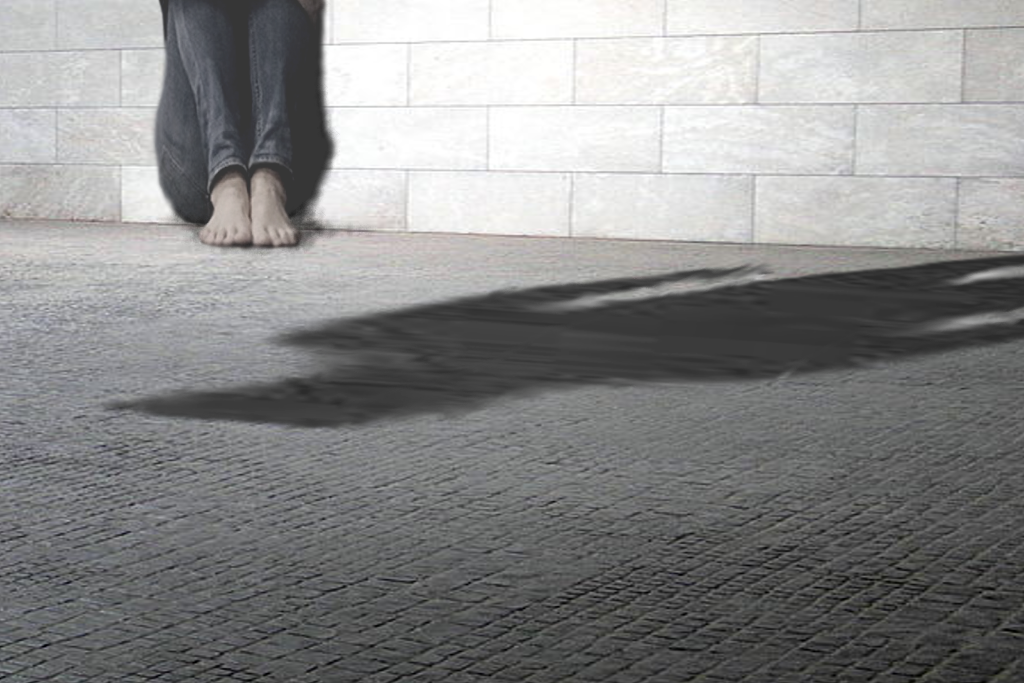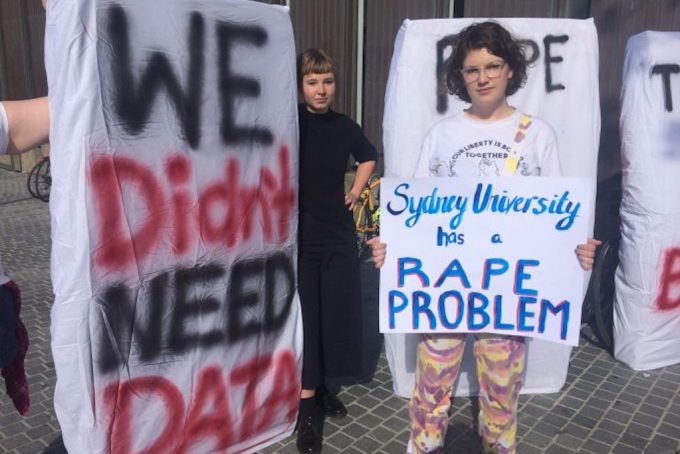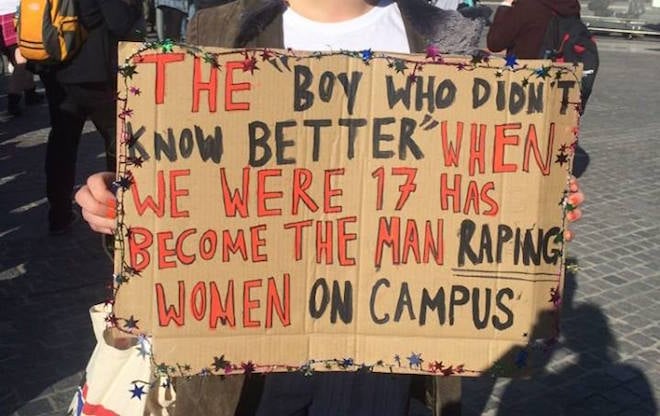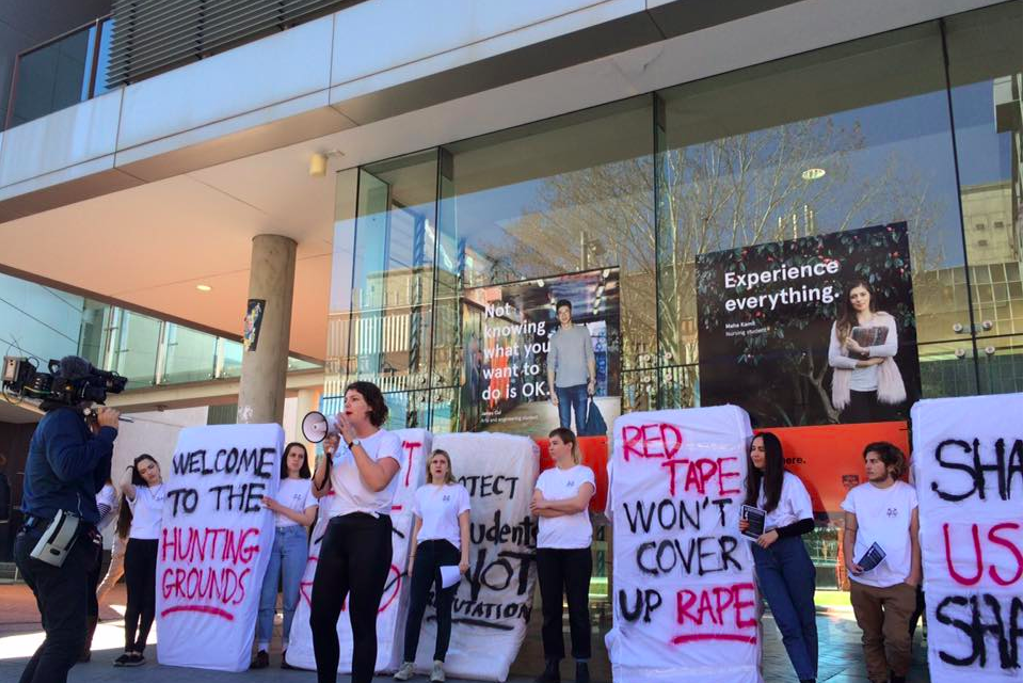No More Screaming Into The Void: This Sexual Assault Report Is The Proof Survivors Needed
#EndRapeOnCampus

This article discusses sexual assault.
This week has been an emotional one for many Australians. Finally, the results have been released from the Human Rights Commission review into sexual assault on Australian university campuses. The findings, as many of us expected, are horrific.
As I scrolled through the report on my way to work, I felt tears in my eyes. It’s both tragic and strangely invigorating to see these stats reflecting so starkly what I, and many other survivors like me, have been screaming into a void for years.
Sexual violence of all kinds — rape, assault, harassment and general hostility — is an epidemic in this country. It’s destroying our young people — especially our young women. It’s corrupting our institutions of higher learning: places where students are supposed to develop safely from children into functioning, clever, contributing adults.
It’s destroying the tenuous relationship between men and women in this country, as men are overwhelmingly revealed to be the perpetrators of sexual violence against women of all backgrounds, as well as of other men. This is an epidemic that threatens the very fabric of our society. And it’s quite literally killing us.
Of course, the survey is not perfect… and so the backlash has already begun. In a confused interview given to Sky News, sex therapist Bettina Arndt questioned the response to the survey, which she dubbed “exaggerated”. “There’s been this extraordinary attempt to cook these figures in any way they can,” Arndt said. “And yet what comes out is this very positive picture.” (Um… ok?)
Helicopter enthusiast Bronwyn Bishop was also recorded slagging off the survey, wondering where the nostalgic days of thirsty appreciation for the humble wolf whistle had gone. Like Arndt, Bishop questioned whether the survey was in fact a media beat-up.
"A good old wolf whistle, gosh I remember the days when that was a compliment, where have they gone?" Bronwyn BIshop on uni assault report
— Rashida Yosufzai (@Rashidajourno) August 1, 2017
And on Twitter, Parnell McGuinness, editor of the Liberal Party’s news website The Fair Go, joined a wave of detractors making (thus far unsubstantiated) accusations about the survey’s “credibility”.
Why is the media running this ridiculous campus sexual harassment "study" as though it were credible?
— Parnell McGuinness (@parnellpalme) August 1, 2017
There’s no doubt that the survey has its downsides, but the crux of it is both absolutely true and 100 percent vital to take on board without any scepticism: sexual violence on campus is rampant and it points to a broader issue with sexual violence in this country (and well, the whole world).
And this survey, though it has its faults, gives voice to hundreds of thousands of survivors who have been begging people to believe them about this epidemic for decades. Despite The First Stone, despite The Hunting Ground, we cry out for help as men destroy us — and still no one listens.
No more. We cannot ignore this. We have our proof and it is insurmountable. No more queries, no more scepticism, no more ignorance. We have already let down too many survivors.
What The Report Illuminated, And Why It Still Hurts
As far as surveys into national disgraces go, the AHRC report is an especially harrowing read.
51 percent of students surveyed reported that they had been sexually harassed at least once in 2016. 21 percent of students were sexually harassed in a university setting in 2016. As Sex Discrimination Commissioner Kate Jenkins tweeted yesterday: “In a lecture theatre of 100 students, two have been sexually assaulted in the past two years”.
Our survey shows that women are disproportionately impacted by sexual assault & sexual harassment at uni: https://t.co/X1aU1kAWPe pic.twitter.com/McmyNBnLwW
— AusHumanRights (@AusHumanRights) August 1, 2017
These stats are not just shocking; they’re absolutely devastating. Our university campuses have become a breeding ground for sexual misconduct of all kinds, against a staggering variety of students. In particular, the report highlighted that transgender and gender diverse students, students with a disability and Aboriginal and Torres Strait Islander students are being harassed and assaulted at a much higher rate.
And, really, in this regard the report just reveals the tip of the iceberg. As Mariam Mohammed wrote in The Guardian yesterday, “I’m wary of how accurately the survey reflects the reality for international students”. As many have criticised, the report was only provided to students in English. There may still be countless international students who have experienced some form of sexual violence but were not given the platform to speak out.
Regardless, the reality is already irrefutably grim. As the survey reported, women were two times more likely than male students to be sexually harassed, and three times more likely to be assaulted or raped. Most perpetrators were male, and overwhelmingly those perpetrators were known to the victims. Postgraduate students also report being sexually harassed or assaulted by a member of university staff.
And, to cap it all off, a horrifically low percentage of these harassments and assaults were formally reported to the university — just 13 percent. Australian universities have been consistently critiqued over poor infrastructure for supporting victims of sexual violence.
Thank you to all survivors who did the survey or made a submission – your voices have been heard #EndRapeOnCampus pic.twitter.com/0K2k1rxEBi
— Kate Jenkins (@Kate_Jenkins_) August 1, 2017
Look, these stats are awful to read, but they’re important and necessary. We cannot look away.
We must read them, no matter how hard it is to do so, because each statistic represents a survivor of harassment or assault who has fought for their voice to be heard. But, even though I’m proud and pleased that these survivors were strong enough to contribute to, as Jenkins calls it, the bid to #ChangeTheCourse regarding sexual violence on campus, reading this report still burns like a brand.
Every stat I read breaks my heart. Every article I scroll through produces involuntary tears in my eyes because we’ve been saying this for years.
It shouldn’t take this much of a smack over the head for our society to realise this is a problem.
Survivors of rape, assault and harassment have been begging authorities and institutions to take notice of us. This AHRC report is a vital step to solving the problem but… we’ve known the problem existed all along. Because we lived it, and — for me at least — it changed us forever. It just shouldn’t take this much of a smack over the head for our society to realise this is a problem. It’s absurd, it’s wrong and it bloody hurts.
When I wrote publicly about my assault for the first time, I received a flood of responses from survivors (some strangers, but many friends and acquaintances) wanting to share their story with me. The outpouring of grief was shocking. Had this many women — women I knew and cared for — really been hiding this horrible secret? Had they all been living through this same trauma?
They had, and they still do. Because when you share your story of assault and survival — of harassment and hostility — you are often scorned, silenced, or re-traumatised by scepticism and disdain. We still don’t want to hear from survivors of assault and harassment, and the detractors from this AHRC report prove that.
Honestly, what will it take for us to accept this epidemic of sexual violence at face value… to do something? Will we ever be able to provide the kind of support our students — and Australians all across the country — need to recover from their trauma?
Is there any future in which we can ensure these incidents never even happen to begin with?

Where Do We Go From Here?
I have to believe there is a better future ahead for us, because the alternative is just far too devastating.
We have done such a disservice to victims of harassment and assault so far. All we need to do is click once our twice out of our comfort zones online to see that people everywhere, especially women and non-binary people, are crying out for help. They want us to act, and I think deep down we want to act as well.
But the way to end rape on campus, to stem the vile epidemic of sexual misconduct and violence across our country, is to face some hard truths about our community — and about the act of sexual violence itself.
We need to stop applying the phrase “innocent until proven guilty” to the accused alone. Survivors who speak out about their assaults do so at incredible risk to their personal, financial and emotional security. We need to stop assuming that all women who report harassment or assault are lying, because it is destroying survivors. It’s destroying all of us.
If survivors of sexual violence do not feel there is a comfortable, supportive and non-judgemental space in which to report their assaults, we will never be able to hold perpetrators accountable.
We need to forget what we think we know about sexual violence. Reducing sexual harassment to the “harmless wolf whistle” is not acceptable; implying that assault and rape are all about sex and pleasure, instead of power and dominance, is not just problematic, it’s clueless and wrong. Survivors do not “invite” sexual harassment or assault because these attacks are not about desire. They are about a perpetrator dominating and destroying a victim to serve their own powerful self-image.
We need to radically change the way institutions (such as universities) and authorities (such as police) approach and offer support for victims of sexual violence. There is a reason the AHRC report revealed that only 13 percent of on-campus incidents were reported in 2016: these services are not often safe and accessible for survivors of sexual violence.
Survivors do not feel supported; they do not feel believed. Part of that is the rape culture in our society, but it’s also up to our institutions and authorities to change their attitudes and their outlook.
Thank you, @uniaus, for funding this vital service. #EndRapeOnCampus pic.twitter.com/Wt2BDSlQeb
— EROC Australia (@EROCAustralia) July 31, 2017
We must make our institutions of higher learning safe for young people again. Otherwise we risk flooding society with survivors, whose ability to thrive and contribute to society is hampered by shame and trauma; and, worse still, with entitled perpetrators who will continue to spread their toxic behaviour out in the world.
And, finally, we must change our attitude towards men’s involvement in sexual violence. It should never be up to the victims to avoid an attack. It is the job of our Australian men — who it is proven are disproportionately the perpetrators of myriad forms of sexual misconduct and violence — to change their behaviour. And the only way we can do that is through accountability, education and vigilance.

We can no longer allow “boys to be boys”; we can’t accept lighter sentences for sexual offences because toxic male privilege and our male-bred rape culture. We have to do better.
My life was altered forever by my assault, and I hope every day that what happened to me will not happen to someone else. But the sad fact is: it will. It will keep happening, again and again, until we change.
So let’s do it. Let’s change the course of our culture and our community. Let’s be better, for all our sakes.
–
If you or someone you know is impacted by sexual assault call 1800RESPECT on 1800 737 732 or visit 1800RESPECT.org.au. In an emergency, call 000.
Men can access anonymous confidential telephone counselling to help to stop using violent and controlling behaviour through the Men’s Referral Service on 1300 766 491.
—
Matilda Dixon-Smith is a Junkee Staff Writer. She tweets at @mdixonsmith.

